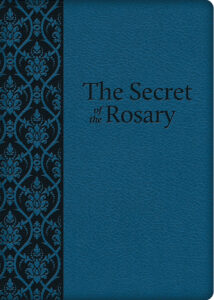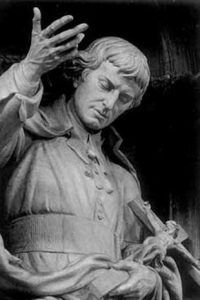THE OUR FATHER or the Lord’s prayer has great value—above all because of its Author Who is neither a man nor an angel but the King of angels and men, Our Lord and Savior Jesus Christ. Saint Cyprian says that it was fitting that our Savior by Whom we were reborn into the life of grace should also be our heavenly Master and should teach us how to pray. The beautiful order, the tender forcefulness and the clarity of this divine prayer pay tribute to our divine Master’s wisdom. It is a short prayer but can teach us so very much and it is well within the grasp of uneducated people, while scholars find it a continual source of meditation on the mysteries of our Faith.
The Our Father contains all the duties we owe to God, the acts of all the virtues and the petitions for all our spiritual and corporal needs. Tertullian says that the Our Father is a summary of the New Testament. Thomas à Kempis says that it surpasses all the desires of all the Saints; that it is a condensation of all the beautiful sayings of all the Psalms and Canticles; that in it we ask God for everything that we need; that by it we praise Him in the very best way; that by it we lift up our souls from earth to heaven and unite them with God.
We should say the Our Father with the certitude that the eternal Father will hear it because it is the prayer of His Son Whom He always hears and we are His members. God will surely grant our petitions made through the Lord’s Prayer because it is impossible to imagine that such a good Father could refuse a request couched in the language of so worthy a Son, reinforced by His merits, and made at His behest.
I have a word for you, devout souls, who pay little attention to the prayer that the Son of God gave us Himself and asked us all to say: It is high time for you to change your way of thinking. You only like prayers that men have written—as though anybody, even the most inspired man in the whole world, could possibly know more about how we ought to pray than Jesus Christ Himself! You look for prayers in books written by other men almost as though you were ashamed of saying the prayer that Our Lord told us to say. You have managed to convince yourself that the prayers in these books are for scholars and for rich people of the upper classes and that the Rosary is only for women and children and the lower classes. As if the prayers and praises which you have been reading were more beautiful and more pleasing to God than those which are to be found in the Lord’s Prayer! It is a very dangerous temptation to lose interest in the prayer that Our Lord gave us and to take up prayers that men have written instead.
When we say this wonderful prayer we touch God’s heart at the very outset by calling Him by the sweet name of Father—Our Father. He is the dearest of fathers: all-powerful in His creation, wonderful in the way He maintains the world, completely lovable in His Divine Providence—always good and infinitely so in the Redemption. We have God for our Father, so we are all brothers—and heaven is our homeland and our heritage. This should be more than enough to teach us to love God and our neighbor and to be detached from the things of this world.
The Son of God has always glorified His Father by His works and He came into the world to teach men to give glory to Him. He showed men how to praise Him by this prayer which He taught us with His own lips. It is our duty, therefore, to say it often—we should say it reverently and attentively and in the spirit in which Our Lord taught it.
This article is taken from a chapter in The Secret of the Rosary by St. Louis de Montfort, which is available from TAN Books.









